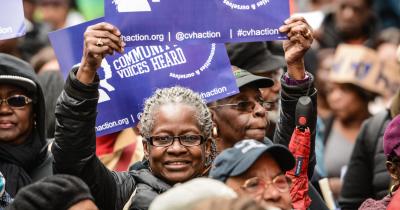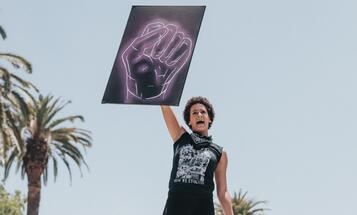
Community Voices Heard: Leading the Fight for Fair Housing
Community Voices Heard is leading the charge to hold the New York City Housing Authority accountable to its obligations to low-income residents.

“Everyone wants to live in a stable community; everyone wants to live in a community where people look out for you.” This is what Afua Atta-Mensah, Executive Director of Community Voices Heard (CVH) in New York, NY had to say about one of their missions of fighting for and protecting fair housing.
Housing stability is critical to building up communities and helping people move up the economic ladder. Stability was part of the social safety net for those of us who remember growing up in multi-generational neighborhoods where kids played as elders stood watch from front porches and stoops. Neighbors and friends often shared or borrowed from each other as needed and listened for the sounds of folks in the community: rising for work, returning from church or school, the swell of familiar voices as people come and go.
Community Voices Heard, a member of Demos’ Inclusive Democracy Project, helps empower and organize residents to advocate for their right to a stable and affordable place to live. Atta-Mensah says doing so shifts the narrative about fair housing from politicians to tenants, giving them the power to make change for their own lives. Furthermore, working on democracy reforms bolsters their ability to advocate and build power for low-income New Yorkers.
CVH is leading the charge to hold the New York City Housing Authority accountable to its obligations to low-income residents. New York’s is the largest public housing system in the nation. CVH’s fight to ensure stable and affordable housing mirrors the struggle for people across the country. The general standard is that a household should pay less than 30 percent of its income on housing. But in New York City, as well as in Denver, Honolulu, Los Angeles, Miami, San Diego, San Francisco, and Washington, D.C., roughly two-thirds of low-income renters pay more than 50 percent of their income on housing. For the nation as a whole, in 2016, 62 percent of renters in the bottom fifth of the income distribution paid more than 50 percent of their income on housing. In 1960, 44 percent of the bottom fifth did. There was severe hardship for low-income households in the 1960s, but it has gotten significantly worse since then.
This crushing level of housing costs is no doubt behind the disproportionate exodus of low-income residents out of our nation’s most expensive cities. When housing costs rise to unaffordable levels and incomes stagnate or decline, many families have no choice but to move—voluntarily or involuntarily. The sociologist Matthew Desmond has been documenting the tens of millions of evictions in America that throw families—parents and children—into a downward socioeconomic spiral.
These numbers demonstrate why CVH is on the front lines to support fair housing. For example, in 2017 when the Trump administration proposed a $7 billion cut to the Department of Housing and Urban Development (HUD), CVH led an action with the #NoCuts Coalition at the regional office of HUD in partnership with labor unions, faith leaders, senior advocates, and public housing residents. They successfully invited Senator Chuck Schumer to tour public housing, and to commit to making funding for HUD a priority. He subsequently pushed back on the proposed budget cuts. CVH also led a march of nearly 1,000 tenants in Washington, D.C., and in August of this year, they are spearheading a Day of Action that will include organizing and technical assistance for public housing advocates in 14 states including Arizona, California, Delaware, Florida, Illinois, Maryland, Massachusetts, Nevada, New Jersey, New York, Ohio, Pennsylvania, Texas and Utah.
Wealth should not determine whether anyone has a stable place to live. Unfortunately, recent efforts to weaken the government’s commitment to fair housing threatens those who need it most: people of color, the poor, elderly and disabled among us. That is why Demos is proud to partner with Community Voices Heard, a leader in the fight to protect fair housing and a model for grassroots organizing.




